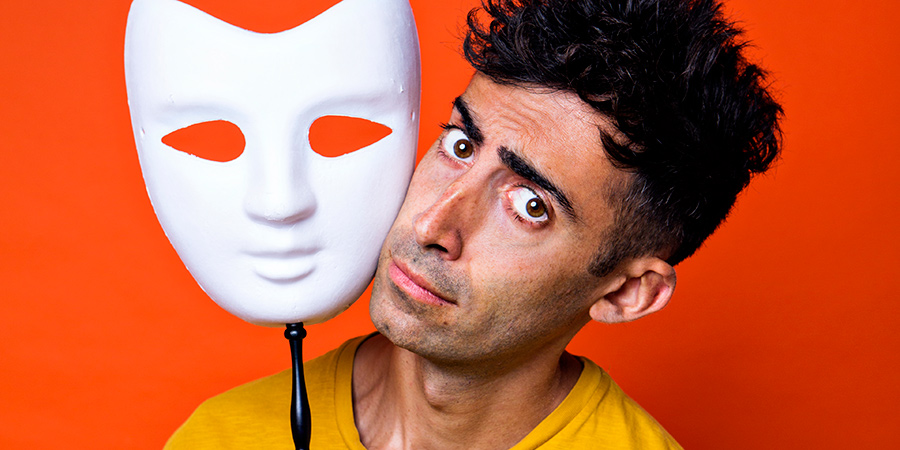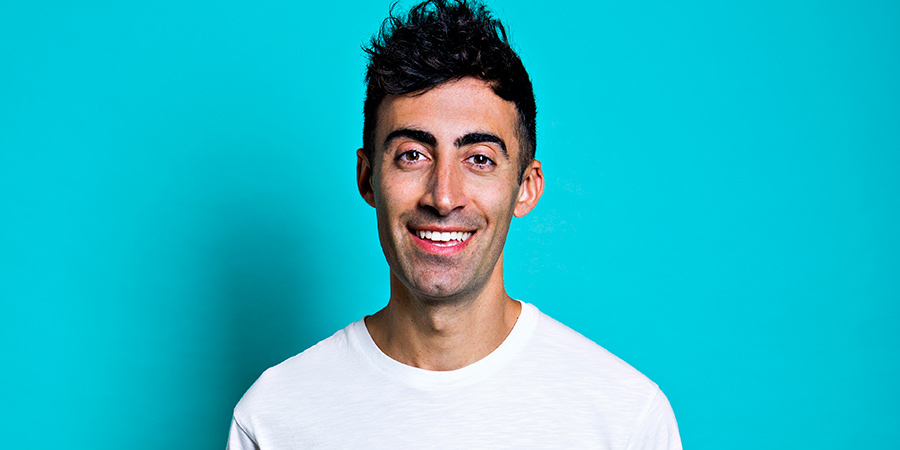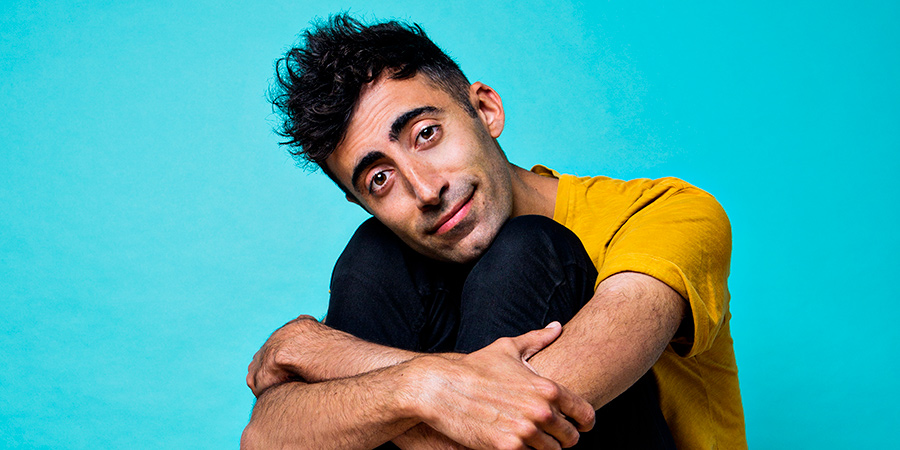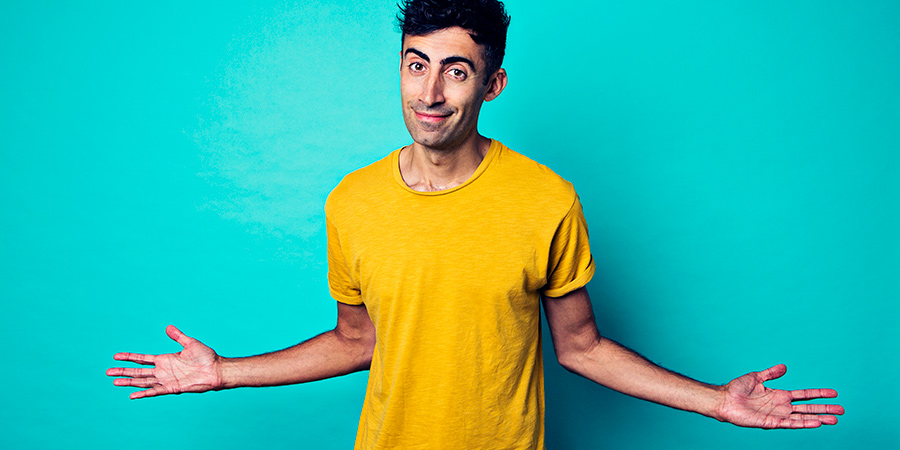Richard David-Caine is focusing on mental health

Richard David-Caine debut high-octane character comedy show is themed around the new pandemic we now face: a mental health crisis. As someone who has suffered with anxiety, Richard feels that now is the right time to open up about his own struggles, whilst shining a light on the societal mental health problems we all now face. He explains more in this interview...
Richard, welcome back to Edinburgh! You're no stranger to the Fringe, are you?
That's right, I was here for five years with comedy sketch troupe, Four Screws Loose. It felt like I cut my teeth here, and everything I now do on TV is thanks to this mad but wonderful (but mad) festival. I failed here, I succeeded here, I drank Skittle Bombs here, I grew up here.
So, what brings you back, seven years later?
The Edinburgh Fringe is like my lover on the side. I tried to settle down and get married to a stable comedy job, but in the end, only the Fringe satisfies my amorous itch. (Are we going with this metaphor?) And what a naughty lover she is. She's messy, she hurts you, but God it feels good to be in her again. That went too far, I apologise.
You're here this year with your debut solo show. What happened to Four Screws Loose?
I had such a fun time with Four Screws Loose but, as is often the case with boybands, we started wanting different things and mutually split up. I wanted to go solo. I guess I'm Robbie Williams... no, that's not current enough. I'm Zayn Malik. Is he current?

What made you want to do a solo show?
It was never a conscious decision to do a solo show - the logical part of my brain was desperately asking me to reconsider. But I needed to. This show was born out of a stage in my life that needed to be expressed, and a subject I was desperate to talk about.
Which is?
Over the last year, I've become increasingly aware that societal mental health was at an all-time low. It seemed that countless people around me were struggling to re-integrate back into this noisy and isolated new world, myself included. I eventually reached a point where I was so deeply anxious, so deeply in my fearful thoughts, that I struggled to contemplate going on. This was something I'd never faced before.
Around this time, I noticed increasing adverts popping up for charities like the Samaritans and MIND, telling us to talk to someone about it, yet very few people actually were. It was as if everyone was playing a game where we all had to smile, push on and indicate everything was ok.
It reminded me of how an actor wears a mask in a performance. A mask that shows 'I'm happy', or 'I'm confident', or 'I'm-definitely-not-having-a-breakdown'. The hilarity and tragedy of the masks we all wear were what lead me to write this show.
Tall, Dark and Anxious is a comedy show first and foremost, but doesn't shy away from the subjects of mental health, inner-conflict and even suicide. I also use the opportunity to put my money where my mouth is and take off my own masks, which is both incredibly exposing and utterly empowering. There has never been a show like this before, I'm pretty certain of that.

Why did you choose to talk about this through comedy?
The thing about comedy is that when you make someone laugh, you open them up - literally. They lean back, and expose their hearts, expressing a trust in you. 'I like you, you make me happy, keep talking'. So, I've found it to be the perfect platform to talk about more serious issues.
How have audiences reacted?
I've had the most phenomenal reactions from the show so far. People crying with laughter one minute, and then crying in empathy another. I've had standing ovations, beautiful comments, and meaningful hugs after the show. One woman was a mental health nurse and deeply thanked me for breaking the stigma of talking about this subject, which felt just wonderful. By dropping my own masks, I invite others to do the same.

How have you found performing solo?
Wow, it's like the feeling of acting, but on steroids. All the glory is yours, all the pain is yours. It can, at times, be a very lonely experience, and so I've consciously surrounded myself with a support network or friends, performers and front of house/box-office staff. After all, that's what the show is about - reaching out to others. I even convinced one of my best friends, Emily, to do the tech for me, just so I'd have a friend in the room.
You're well known for your work in children's television, most notably for shows like Swashbuckle, Class Dismissed and Horrible Histories. Despite your advisory 14+ age rating, have you had any younger fans sneak into the show?
Yes. Oh, god. This is not a kid's show. I literally start the show in a leather unitard and ask them... 'Are you sure you want to stay?' And they do. I mean, to be fair, older kids are pretty savvy to swearing and sexual references these days, for better or worse. But they'll never look at me in the same way again, that much I know.
Would you like this to lead to other opportunities in adult comedy?
The thing is, during all the kids' TV I've done, I've never stopped doing my adult work too (apologies, adult work sounds like porn. I haven't done that. Yet. But you never know...)
My life consisted of filming something like People Just Do Nothing and then scooting off to be a pirate on CBeebies; it was wonderful. I would say, however, that this industry does love to shove you in a box and say 'this is all you can do', so I'm definitely using this as a conscious decision to say 'I can be more than a pirate!' Oh my god, I'm so getting that on a t-shirt.
Help British comedy by becoming a BCG Supporter. Donate and join us in preserving, amplifying and investing in comedy of all forms, from the grass roots up. Advertising doesn't cover our costs, so every single donation matters and is put to good use. Thank you.
Love comedy? Find out more